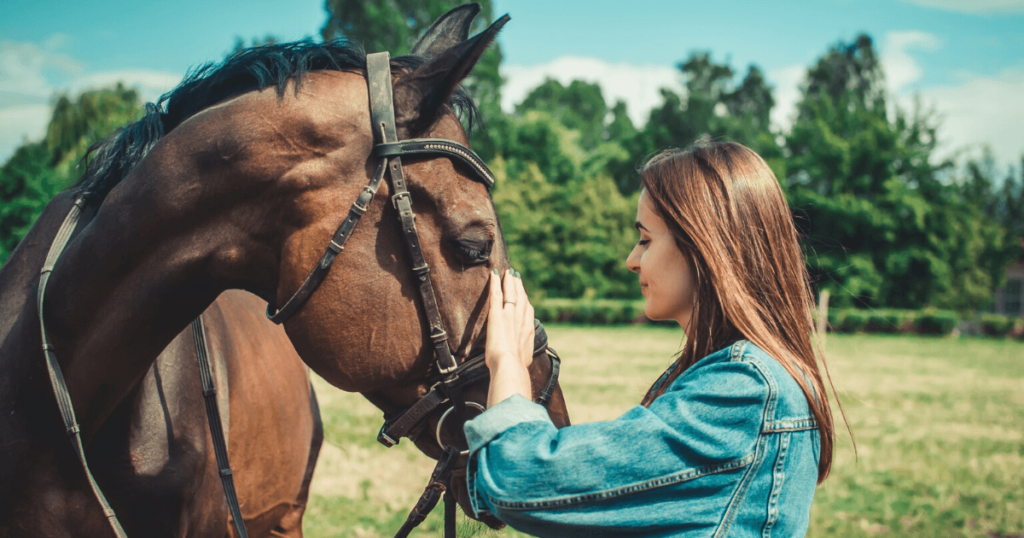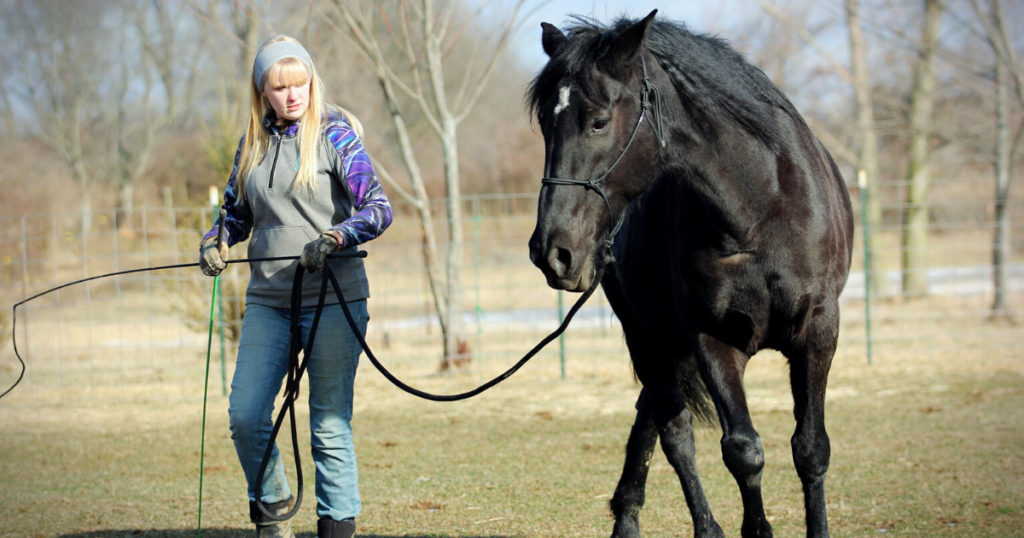


There was a voicemail on my phone.
It was from a woman I didn’t know, but she knew of me and my involvement with horses. She vaguely explained in her voicemail that she was seeking help with a horse situation and asked for me to return her call.
Curiosity getting the best of me, I called her back to find out more. It took the woman only a few moments to explain what her family was dealing with before I quickly caught on to a scenario that I see all too often: green owner vs. green horse.
I quickly Realized the scenario that I see too often: green owner vs. green horse.
It’s not at all uncommon for first-time horse owners to run into difficulties with their horses early on. If that’s you, don’t feel bad about it because more of us have been there than you may realize.
So you want to buy your first horse…
If you’re thinking about buying your first horse and consider yourself to be a beginner, here are a few tips that will help you avoid falling into a similar situation where you end up with an animal that’s not suitable for you or your family.
1. Be excited, but stay smart
I remember my family’s horse shopping days when I was a young teenager of about 13-14 years old. Every horse we looked at was, in my mind, the “perfect” one! After all, it is every girl’s dream!
Dearest First-Time Horse Owners: don’t just buy a horse because it’s pretty, especially if you have children and they are putting added pressure on you. Chances are, they’ll take just about any pretty horse because many young kids don’t yet understand the responsibility of horse ownership. Avoid impulse buying just because everybody’s excited. It’ll break your heart a lot more if you buy the horse and have to sell it later than if you walk away before making the purchase.
2. Invest in riding lessons
My personal lack of riding experience was likely a major contributing factor to all of my accidents after acquiring my first horse. I didn’t understand how to read their body language or how to give proper riding cues. First-time horse owners should acquire general knowledge regarding the care and upkeep of a horse, along with basic riding skills and how to saddle up correctly.
Keep in mind, actually knowing HOW to ride is very different from paying for pony rides at the state fair or hiring a guide to take you out on a senior horse for a slow trail ride. Those horses are well trained and could do their jobs in their sleep. They are also usually accompanied by handlers with years of experience, not first-time horse owners.
TIP: We highly recommend buying a riding helmet to ensure your skull stays protected in the event of an unexpected dismount!
3. Take an experienced horse person with you
This is imperative when you’re new to horses and don’t know what to look for, even after you’ve taken some riding lessons. An experienced horse owner or trainer will know how to check for signs that your prospective horse is sound, healthy, and rides well. These are things that can easily be missed if you aren’t yet familiar with what to look for.
Don’t know anybody like this? If you’ve been taking lessons (as suggested above), ask your instructor if he/she would be willing to accompany you!
4. Handle the horse on the ground when you arrive
If the seller suggests having the horse tacked up and ready to ride when you arrive, ask that they wait until you get there. You’ll want to see how the horse behaves coming out of the stall or pasture, being led around, and getting groomed and tacked up. If the horse is giving its owner trouble before it even gets the saddle on, you may want to keep looking unless you believe you are experienced enough to handle those issues.



5. Ask the seller to ride the horse first
It can be helpful to see how the current owner handles the horse from the saddle. Does the horse stand still for mounting? Does it appear stressed and high strung? Toss its head and refuse commands?
While these may not concern an experienced equestrian, these vices are likely unsuitable for a beginner. Additionally, if the seller isn’t comfortable getting on the horse before you do, that could be a problem. Ask the seller to ride the horse around for a while so you can see how it moves and how it behaves. (This is also a great time to look for any lameness or possible injuries while you are on the ground.)
Keep in mind that a horse may also do really well for an experienced rider, but it might not be the same for someone who is just learning.
6. Ask questions about the horse’s history
How long has the seller owned the horse? Why are they selling? Does the horse have registration papers that will be signed over to you upon the sale? You can never ask too many questions. If the seller won’t say much or hasn’t owned the horse long enough to provide this information, find out if there was another previous owner you can get in contact with.
TIP: Registration papers can provide additional insight into the previous owner history. I found one of my mare’s previous owners on Facebook a whopping 15 years after purchasing her!
7. Don’t assume that every seller is honest
Hopefully, you will be able to get a quick gut-check on the honesty scale of your seller when you first speak with them. There are a lot of shady sellers who are looking to get a quick sale, so be careful about who you deal with. Avoid dealing with large animal auctions or horse traders looking to make a quick buck. The available history on these animals is always extremely vague and they often come with health problems.
If your gut tells you something isn’t quite right, avoid the purchase. Ask around at local barns and try to find a reputable seller.
8. Call the seller’s farrier and veterinarian
Ask the seller who their regular farrier and veterinarian are. You should’ve been doing your research on these local providers prior to starting your search, and if that’s the case, you may recognize their names.
Once you get their details, it may be a good idea to give them a call (a quick Google search should provide their numbers) and inquire about the animal you are considering. While they may not be able to give you specifics, they will likely be able to answer general questions such as “Would you recommend that I buy this horse?”
You may also want to bring in your own vet to do a basic check-up on the horse before buying if you have any concerns, but expect to cover this expense out of pocket.
9. Keep your options open
I personally operate under what I like to call, “The Rule of 3”. This means that before making big decisions, I take the time to look at 3 different products/services/contractors (or in this case, horses!) so that I can make the best choice possible without getting too attached to just one.
This does not mean that your perfect horse won’t be the first one you look at; it’s entirely possible this could happen! However, if it doesn’t feel like a perfect match, remind yourself that it’s OK to keep looking until you find the one that’s just right for you.
10. Continue learning as often as possible
Once you finally find the horse that’s right for you, continue to educate yourself. The best thing you can do for your horse is to be knowledgable. It’s all too common that first-time horse owners are (unintentionally) at the root of their horse problems, so find the resources that will allow you to better understand how a horse thinks.
Remember, safety always comes first. Things aren’t always going to go smoothly. Even great horses act up once in a while, so you’re going to want to learn how to handle various situations in the safest way possible.
RELATED: Is horse ownership right for me (and my wallet)?
–
This post was originally published on






I think that’s a great idea to take an experienced horse owner when looking for a horse to buy to check for signs if the horse is healthy. My sister has always wanted to own a horse since she was a child and is currently looking to get her first horse. Having a healthy horse is important to her, so she should definitely take an experienced horse owner with her when checking out horses and get a good horse veterinarian to ensure the horse she does get is in a sound and healthy condition.
It’s good that you talked about observing the horse’s behavior while being handled before deciding to purchase it. My daughter has expressed her interest in owning a horse after riding one during a vacation. I’m planning to buy her a horse as a gift for her upcoming birthday, and I’ll definitely observe first how the horse behaves to see if my daughter can handle it without any problems.
just so you know you should never buy an animal like that for someones birthday. I know that comment is very old but god forbid you buy a horse and your daughter ends up not loving or being committed to the sport and the horse becomes a lawn ornament
I like how you said the best thing you can do for your new horse is be knowledgeable. I think that’s so important because if you know the best tips and have the best products to take care of your new animal, the horse will benefit physically and emotionally. My friend is considering buying a new horse for her daughter to learn to ride, but she isn’t sure what she needs to get in order to prepare. I’ll have to recommend that she find a reliable and knowledgeable horse feed store in her area that can offer a variety of horse care products, so that she can be ready to care for her new horse.
My wife and I want to get a couple of horses so that we can put our property to good use. I found it helpful when you explained that it is a good idea to bring a horse trainer with you when looking at one so that they can tell you if one is healthy or not. I think it would probably be a good idea to get the right kind of shelter for the animals before making a decision as well.
My friend is interested in taking care of animals, and she wants to learn more about horses. What you said about how she could try and look for a horse person who can help determine if a horse is healthy is a great idea. I’ll suggest that she talk to one so that she’d get advice on how to feed it as well!
I’m getting a horse whhen I’m eight-teen so I’m prepearing
This is so helpful im planning on getting a horse next year as I’ve been riding for 6years and have been working at my yard twice a week for a few years now, but I’m still trying to learn as much as possible so reading this is definitely going to help with the decisions.